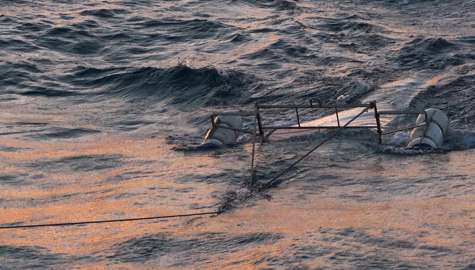The Mediterranean Sea classified as the sixth highest region for the accumulation of plastic debris on the planet

The amounts of plastic debris in the Mediterranean are comparable to those reported for the great accumulation areas located in the centres of the oceans
The team of Andrés Cózar, an ecologist at CEIMAR at the University of Cadiz in Spain, provided the first global map of the abundance of plastic debris in the open oceans. The map showed the existence of five areas of large-scale accumulation of floating plastic debris in the centres of the North Pacific, South Pacific, North Atlantic, South Atlantic and Indian Oceans. Ocean currents transport the floating plastic dumped by man to central convergence areas in the open oceans where these materials accumulate. However, extensive areas of the ocean susceptible to accumulate plastic debris remain barely sampled or even non-surveyed. This was the case of the Mediterranean Sea, a semi-enclosed sea located in a region where plastic is used intensively.
In a new study published this month in PLoS One, Cózar and colleagues measured plastic concentrations throughout the Mediterranean basin, from the Strait of Gibraltar to Cyprus, finding amounts of floating plastic debris comparable to those described for the five subtropical ocean gyres. "We found plastic in 100% of the sites sampled, with an average density of plastic of 1 plastic item per 4m2 ", says Cózar. The amount of plastic in surface waters is estimated to be between 1,000 and 3,000 tons, "mainly appearing as tiny pieces broken off from plastic objects such as bottles, bags and wrappings". The spatial distribution of plastic in the Mediterranean is patchy, with accumulations of debris scattered throughout the basin, driven by the action of wind and waves.
The accumulation of plastic debris in the Mediterranean Sea is related to the high human presence in the basin, but also to its particular pattern of water circulation, which acts as a trap for the floating plastic debris. The water outflow occurs by means of a deep layer in the Strait of Gibraltar, making it difficult for buoyant plastic to leave the basin.
The Mediterranean represents less than 1% of the global ocean area, but has disproportionate ecological and economic values. It harbours around 10 % of marine species; and fishing and coastal tourism are key sources of income for the people in the Mediterranean region. "Given the biological wealth and concentration of economic activities in the Mediterranean Sea, the effects of plastic pollution on marine and human life are considered to be particularly serious in this area", Cózar says.
In the Mediterranean, plastic debris is reported to have been found in the stomachs of small fish, seabirds, turtles and sperm whales. Another study, carried out last year by Cristina Fossi's team, at the University of Siena in Italy, measured high concentrations of phthalates, a plastic-associated contaminant, in large filter-feeding organisms such as the basking shark and fin whale.
The Mediterranean Sea was known to be overheated and over-fished, and now we must add that it has one of the highest levels of plastic pollution in the world. As the production of more and more plastic materials is likely to continue to increase in the coming years, this may lead to a very depressing picture of the Mediterranean if urgent actions to prevent the release of plastic waste to the environment are not implemented. "Caring for the Mediterranean Sea is taking care of ourselves and future generations", concludes Andrés Cózar.
More information: 'Plastic accumulation in the Mediterranean Sea'. PLOS ONE. DOI: 10.1371/journal.pone.0121762
Journal information: PLoS ONE
Provided by Universidad de Cádiz



















